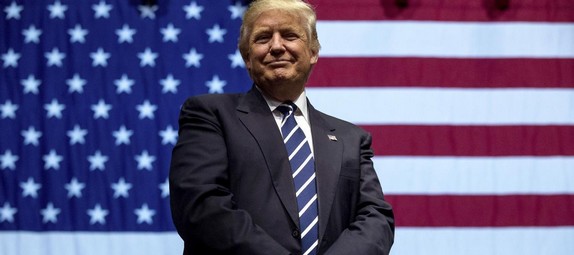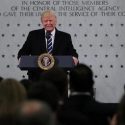What I hope for in the age of Trump
Michael Brendan Dougherty, The Week
Donald Trump’s inauguration heralds the end of an era in politics. Let’s call it the end of the post-Cold War era. It was an era in which both major political parties and their high-minded intellectuals pursued a few political goods tenaciously: namely, multi-party trade deals and mass immigration. It was an era in which America’s policy elite was committed to a unipolar moment in the life of the world, in which U.S. military supremacy sought to deter other nations from even aspiring to be great regional powers.
This era had some real virtues. And where Trump departs from those virtues, his ascent is frightening. For instance, the post-Cold War era was sheathed in a terror of using nuclear weapons. Trump is flippantly fascinated by them.
But the post-Cold War era had some serious defects as well, and it is in beginning to correct those defects that all my hope for Trump’s administration lies.
The post-Cold War commitment to increasing free movement of people and capital has coincided with incredible gains for those who are already successful, and stagnating wages or disappearing jobs for everyone else. It has coincided with the hollowing out of the middle class, and it goes together with the economic and cultural secession of America’s elite into a global clerical class. The left has responded with a renewed interest in socialism. The right has latched onto the nationalist populism of Trump.
It is in this nationalist populism where the Janus-faced nature of the Trump administration’s potential is apparent. Many critics want to see Trumpian populists like Steve Bannon and Stephen Miller sidelined. And I have no doubt that in these men you find some of the worst of Trumpism, like a willingness to enflame racial antagonism for a political kick, and an authoritarian attitude about law and order. But these men also push most aggressively for putting “the forgotten man” at the heart of our political imagination — the men and families and entire regions that have gotten kicked in the teeth by globalization.
These populists recognize that so much of the claimed devotion to markets, private property, and entrepreneurship among Republican policymakers is a thin ideological veil covering the naked self-interest of the rich. Right-wing populists know that a government isn’t just here to protect the operating of the market, but also that it guards the social fabric. If Trumpism turns into an authoritarian nightmare domestically, it is Steve Bannon and Co. who will be to blame. But if Trumpism really will contain a substantive economic and social nationalism that reaches to all citizens, these will be the men responsible for that too.

I’m also hopeful that Trump’s administration will adopt a sanely restrictive immigration policy, rather than the mix of bureaucratic nightmare and neglect that has been the mode of operating for decades. After the longest sustained period of mass immigration in the nation’s history, it’s time for restrictions that would allow America to go through the kind of long period of mutual assimilation with immigrants that helped unite the country after the last great wave of immigration. And I hope that conservatives will evolve from their cheering for the market to organize our social life to actually working toward a nationalist ethic of social cohesion among all citizens.
My hope is that entrusted with power, Trump follows his more dovish foreign policy instincts. The unipolar moment in world history was always going to end, and ending it without an aspiring or revanchist great power rising to dethrone the United States militarily is the best possible ending, just as the British Empire’s mostly peaceful transfer of power to Washington over two World Wars was the best possible outcome for that empire’s end.
I concede that it’s on foreign policy where my hope is clutching the thinnest reed. The last two presidents ran as peace candidates and each pursued wars of choice, in part because the president is given almost unconstrained latitude to do so. But perhaps Trump, being suspicious of experts, will ignore the universal advice of American apparatchiks who believe in the omnicompetence of the American military to salve every irritation across the globe.
Lastly, I hope Trump’s administration ends the cult of sophomoric wonks, ideologues, consultants, and even experienced politicians. Most Washington “experts” hold forth with confidence to prove to themselves the value of their expensive educations, even though they skipped most of the reading assignments. They crashed the economy, they wasted and marooned American military might across the Middle East, they balkanized the American nation, and paid each other handsomely for the tender service, while saying Trump could never win. If an impulsive, self-aggrandizing dolt ends this cult, it would be a fitting judgment.
But in the end, after reviewing my fears (rather grave) and hopes (somewhat tentative) for the Trump administration, I have to conclude that I am pessimistic about Trump’s presidency. I lean toward my fears because I believe Trump has low character. No one who grew up in the tri-state area could think otherwise. I believe his party is undisciplined and fat. And I am pessimistic about a nation that would elect a man like this. I am pessimistic about a nation that would make Jeb Bush, Marco Rubio, John Kasich, Ted Cruz, and then Hillary Clinton his only serious obstacles to power.
My only hopes rest on the implausible idea that Trump’s weird command over people, his style of leadership, his disreputable advisers, and his struck-by-lightning-twice good fortune are somehow a match for this moment. And you never know, it may be so. History contains odd twists and unexpected turns.






